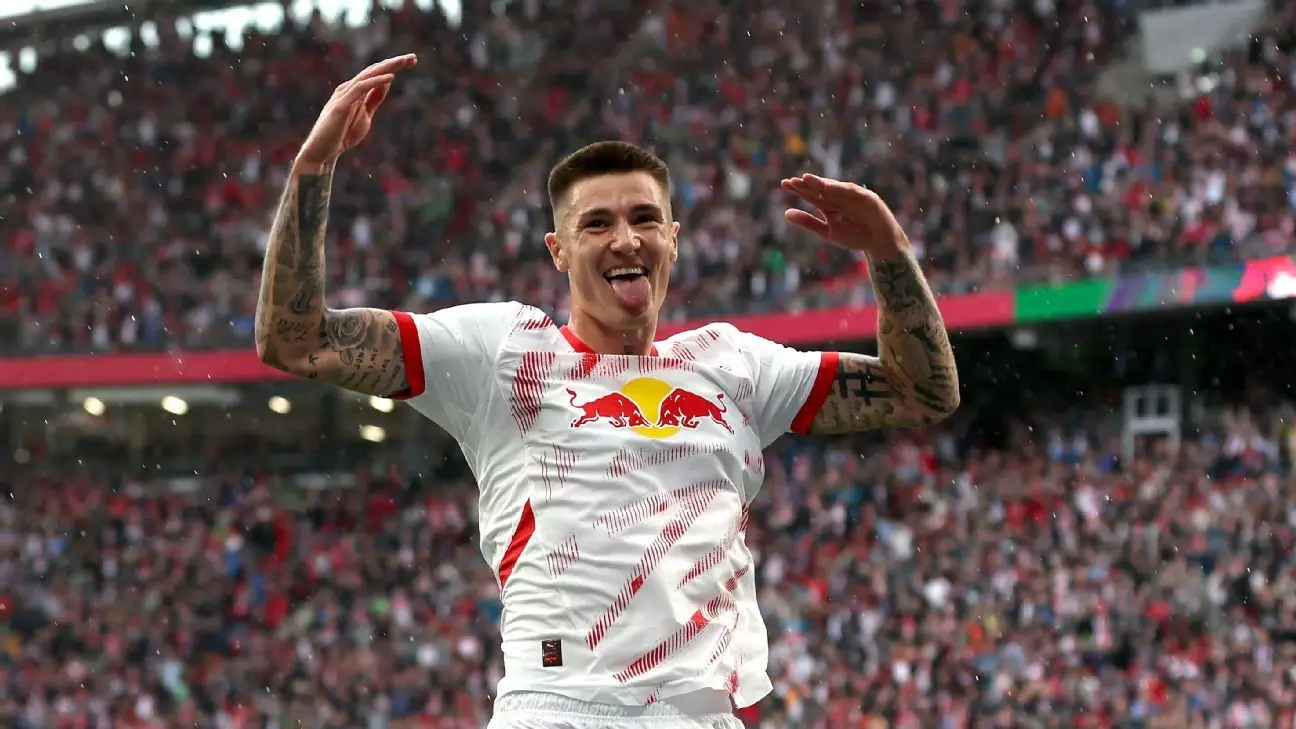Newcastle United’s latest transfer pursuits reveal a club eager to elevate its status to the next echelon of the Premier League. The Magpies are actively engaging in high-stakes negotiations for rising star Benjamin Sesko, signaling their ambition to bolster their attacking options. This move reflects a broader strategy: Newcastle isn’t content with static progress but is instead aggressively chasing top-tier talent to carve a sustainable competitive advantage. Their interest in Sesko demonstrates a clear intent to blend youth with potential—a calculated gamble that, if successful, could pay enormous dividends both on and off the pitch.
However, such ambitions are also emblematic of broader challenges. The Premier League’s transfer window is fiercely competitive, with clubs like Manchester United, Liverpool, and others vying for the same promising forwards. Newcastle’s willingness to bid upwards of €75 million underscores this urgency; they are placing significant financial bets in a bid to stand out as serious contenders. This atmosphere hints at a broader lesson: ambition must be backed by strategic financial investment, but it also exposes vulnerabilities when negotiations falter or targets prefer other clubs.
The club’s pursuit of Sesko signals that Newcastle is no longer just organically developing but is now willing to splash the cash to accelerate their rise. It is an acknowledgment that to punch above their weight, they need to bring in names that can make an immediate impact, even if it means risking hefty financial outlays and the unpredictability of transfer outcomes.
Instability and the Challenges of Building a Cohesive Squad
Amid these pursuits, the club faces significant internal turbulence—most notably surrounding Alexander Isak. The controversy surrounding his perceived dissatisfaction and disputes over transfers cast a shadow on the club’s unity and long-term planning. Newcastle’s refusal to accept Liverpool’s £110 million bid for Isak signals a desire to maintain their core attacking talent, yet the surrounding uncertainty hampers managerial stability.
Eddie Howe’s comments reveal a nuanced dilemma: the manager is committed to supporting Isak but is also visibly disconnected from key developments affecting the squad. Howe claims he learned about Isak’s training arrangements through media reports, highlighting a disconnect within the club’s internal communication channels. Such gaps not only undermine team cohesion but also reflect the larger challenge of managing a competitive team during a period of transition. A club that’s attempting to integrate new signings while managing star player unrest risks destabilizing its foundations if internal communication and leadership aren’t tight.
Furthermore, Howe’s admission that the transfer situation is “far from ideal” underlines that Newcastle is battling a complex web of external and internal pressures. Their restructuring efforts, while bold, risk being undermined by unresolved player dissatisfaction and the emotional toll of transfer sagas. The balance between ambition and stability becomes delicate in such atmospheres; a club cannot afford to be reactive rather than proactive if it hopes to sustain progress.
Strategic Limitations and the Realities of Modern Football
Despite their ambitious targeting, Newcastle’s transfer strategy is not without its limitations. The club’s reluctance—or perhaps inability—to publicly discuss specific targets indicates the sensitivity and unpredictability of the transfer market. Their decision to refrain from commenting openly on Sesko’s potential move to St James’ Park reflects a conscious effort to manage negotiations quietly, but it also reveals the reality that football is increasingly driven by media narratives and fluctuating player preferences.
Manager Howe emphasizes the importance of quality over quantity, a principle that should serve as a guiding star amid the chaos. However, in a climate where clubs are heavily investing in multiple transfers simultaneously, it becomes a challenge to prioritize strategic acquisitions without overextending. Newcastle’s challenges are emblematic of the modern football club that is trying to strike a careful balance between smart recruitment and financial sustainability. It also raises a broader question: how sustainable is this model of aggressive transfer chasing, especially given the financial disparities among Premier League clubs?
The club’s focus on “maximizing quality” suggests a desire for a cohesive, impactful squad rather than a scattergun approach. Yet, the unpredictability of players’ preferences and external factors like agent influence mean that even the best-laid plans can unravel quickly. Newcastle’s pursuit of Sesko exemplifies this tension—a brave leap for a future star, but one fraught with the peril of market volatility.
The Broader Implication: Evolving Power Dynamics in the Premier League
Newcastle’s recent transfer activity and internal struggles point to an evolving landscape in the Premier League’s power dynamic; clubs no longer rely solely on established stars but are actively seeking to cement their future through bold signings of younger talents. Their willingness to spend significant sums signals an intent to challenge traditional giants, pushing the league towards a more meritocratic, talent-driven model of success.
Yet, in their zeal for rapid progress, Newcastle risks rushing into decisions that may backfire if their internal instability isn’t managed effectively. The case of Isak underlines how off-the-field issues can threaten on-the-field success, and how unpredictable player movements can derail even the most carefully crafted plans. This strategic gamble underscores a larger truth: in modern football, ambition alone is not enough; internal consistency, clear communication, and robust management are vital components of sustainable success.
As the club continues to pursue high-profile targets, it must learn that long-term growth depends on a delicate synthesis of financial investment, squad harmony, and internal pragmatism. For Newcastle United, embracing this reality will determine whether their ambitious vision becomes a triumphant chapter or merely another fleeting chapter in their storied history.

